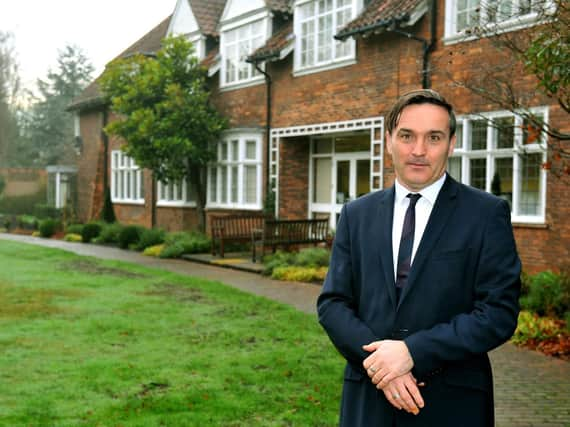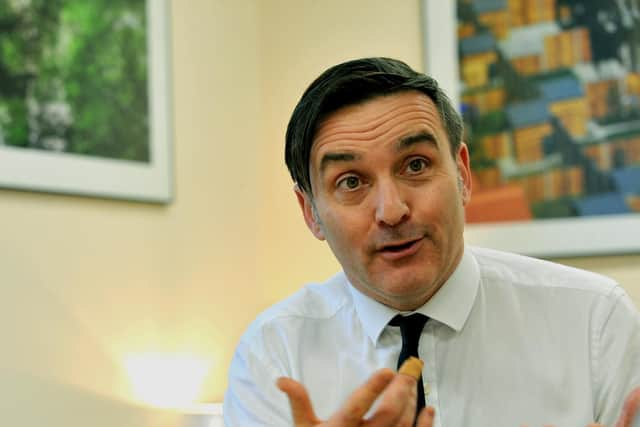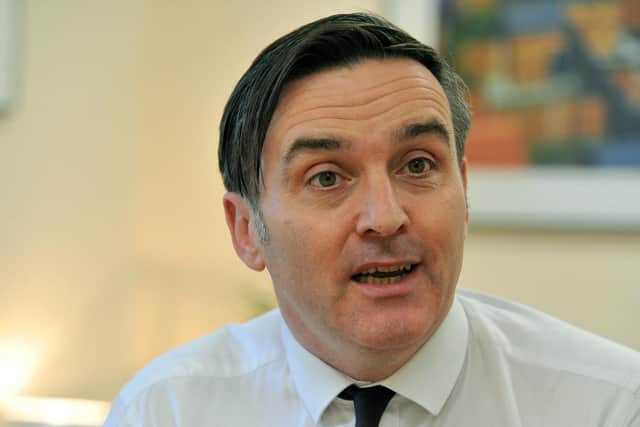Joseph Rowntree Foundation chief executive Campbell Robb: My mission to make work pay in 2019


One of the most famous sons of a city built on chocolate money, the Quaker businessman and philanthropist Joseph Rowntree left a lasting legacy in York with his commitment to community and social justice.
Deeply dedicated to improving the quality of life of employees at his family confectionery business, he belied the rising poverty of the era by setting up the village of New Earswick with good quality housing for workers and managers - including two fruit trees in each house.
Advertisement
Hide AdAdvertisement
Hide AdFast-forward nearly 120 years and the charity that bears is his name is describing his efforts to continue the traditions established by Rowntree in another period of far-reaching changes, both in his home city and across the country.
Campbell Robb is speaking at the York office of the Joseph Rowntree Foundation. His desk is just a few yards from the former home of Joseph's son Seebohm, a pioneering social researcher who undertook one of the country’s first investigations into poverty.
"He wandered around York literally counting poor people because there were no records, he walked around and did almost a census of poverty, that report helped charge the Liberal government of the 30s," he tells The Yorkshire Post.
Advertisement
Hide AdAdvertisement
Hide Ad"We still count poverty but we don't do it by going into the streets any more. Those ideals of driving and making and coming up with the evidence to show what happens, we are going to keep doing that."


In the modern-day equivalent of Seebohm's work, the JRF last month released a report setting out what it described as a relentless rise in the number of working families struggling to make ends meet over the last five years. The charity has identified that there are 1.2 million people in poverty in Yorkshire and the Humber, 670,000 of whom are working adults.
Housing costs, transport and the way social security works all play a part in the rise in poverty, but Mr Robb says his focus is on making work pay. He cites examples of places across Yorkshire with large numbers of people in service industries like hospitality and care, characterised by relatively low pay and a lack of chances to progress.
"You see it everywhere now, you can really feel it and you can talk to people all the time," he says. "They are doing what they are supposed to which is work hard, have a full-time job, and they are supposed to be able to look after family and buy a house, and most of them can't."
Advertisement
Hide AdAdvertisement
Hide AdThe JRF recently helped produce the film A Northern Soul, based in Hull during the City of Culture, and Mr Robb describes a moment from the production which sums up the problem facing many workers.


"At one point the main character turns round the camera, he has just come off a shift in the factory and says 'I have worked all my life, grafted really hard and I have got nothing. I have got debt, I've got no home'.
"How do we make work pay for people, give them a real chance of progression, how do we work with employers and the state and unions to really create a different way of working. Whatever happens post-Brexit, we need an economy that really works for everyone."
Advertisement
Hide AdAdvertisement
Hide AdServing also as chief executive of the Joseph Rowntree Housing Trust, a housing association and care provider covering York and the North East, Mr Robb takes a keen interest in what is going on the city.
"York is one of the few cities left in the country where the Government and the council are yet to agree a housing plan, a Local Plan for how they address the housing needed", he says.
"There are similar cities like Cambridge and Oxford which are very successful towns which are struggling with lots of things, one of which is what kind of jobs do you create.
"There is almost full employment in York but it is a certain type of employment, we see that there is a real demand for affordable housing in York.
Advertisement
Hide AdAdvertisement
Hide Ad"It is really expensive and getting more expensive, and there is not that much genuinely affordable housing being built. There are pockets of real poverty in York and across Yorkshire, we work in Scarborough and Hartlepool, we see there is a real challenge."
The Joseph Rowntree Housing Trust still manages the homes in the village of New Earswick, but in what Campbell Robb describes as a “very exciting” development the community has now taken ownership of one of its assets.
The trust struggled to run the village swimming pool and feared it would have to close the site, but on December 31 a community transfer was carried out, handing its ownership over to a local organisation of volunteers.
Mr Robb says the move is part of a wider trend of assets being handed over to local residents.
Advertisement
Hide AdAdvertisement
Hide Ad“It’s much better that they run that pool and feel ownership of it, they are not being done to any more, they have not got some distant organisation, whether it’s us or the council, doing it.”
Growing up in Glasgow in the 1980s, as the city was gripped by recession and a crisis caused by the closing down of its industrial base, Mr Robb went from university to Westminster and worked for Sheffield MP David Blunkett during his time as Shadow Health Secretary.
After spells working at the National Council of Voluntary Organisations, which represents thousands of the country's charities, he went into the civil service for a while to see how government worked before joining homelessness charity Shelter. He joined the JRF in 2016 and splits his time between York and London, where his two children go to school.
After seeing the improvements to levels of pensioner poverty in the 1980s and later child poverty, he believes change is possible but is reluctant to say he is optimistic the future in an uncertain post-Brexit world.
Advertisement
Hide AdAdvertisement
Hide Ad"On a hard look at the numbers right now, everything is going in the wrong direction in terms of all the poverty indicators", he says.
"Am I optimistic? It is so hard to tell what will happen. I started in politics in 1992 and this is the most uncertain time we have faced as a country and in political debate and the nature of the political debate.
"If you are poor and you see this debate, what difference is it going to make to their lives? I will reserve judgement on whether I am optimistic. We have to keep fighting because if there isn't a voice saying what's going on, the challenge is that it gets forgotten."